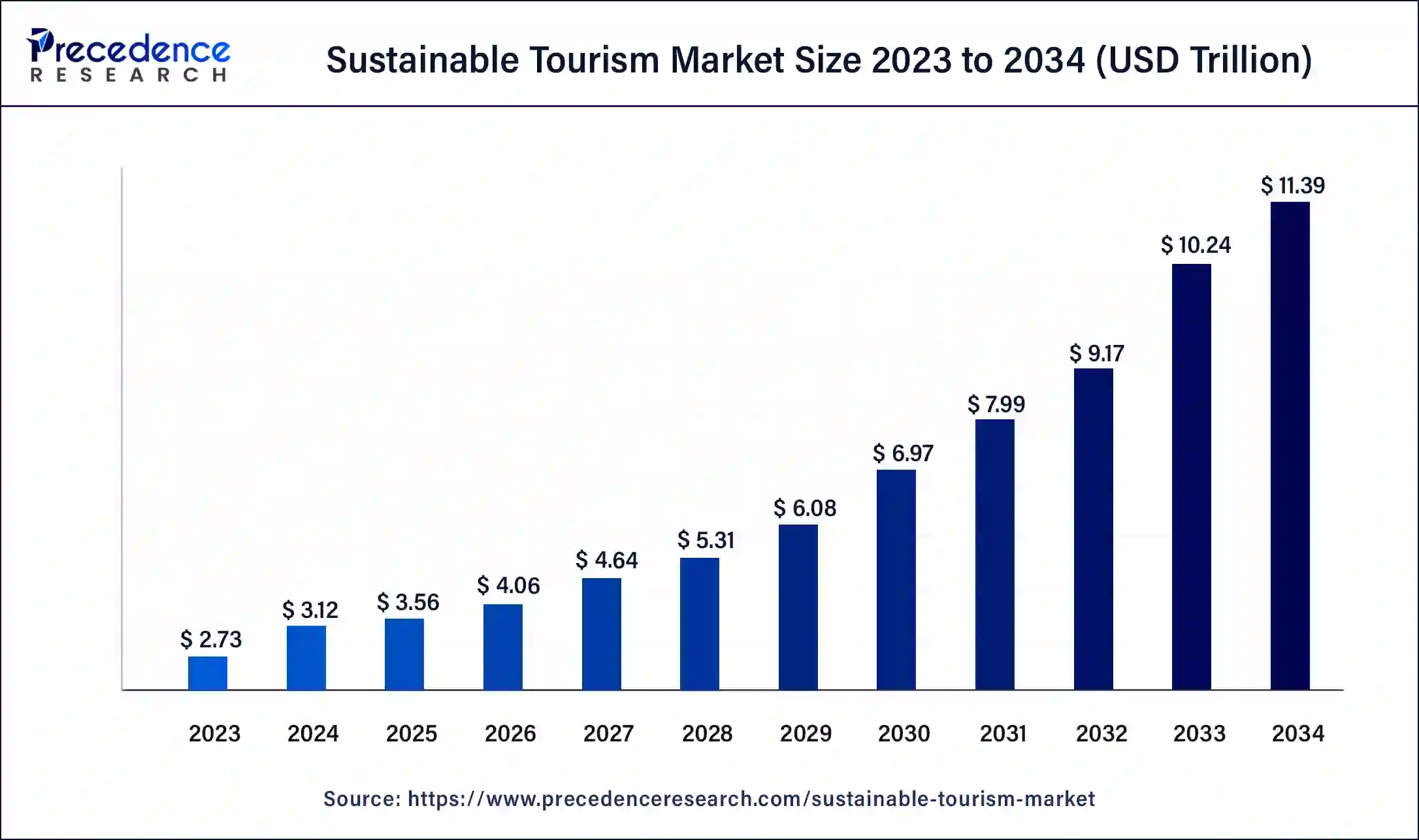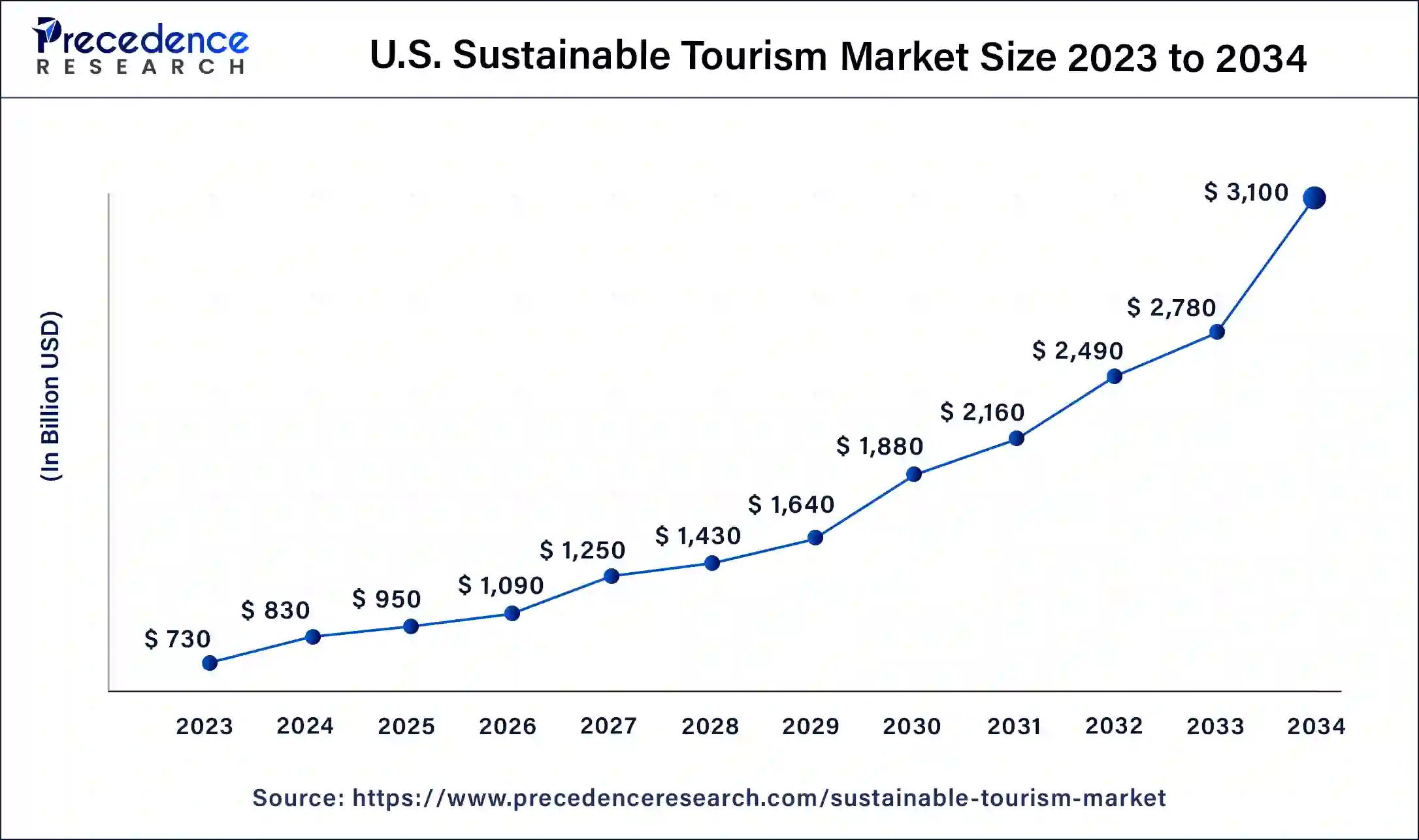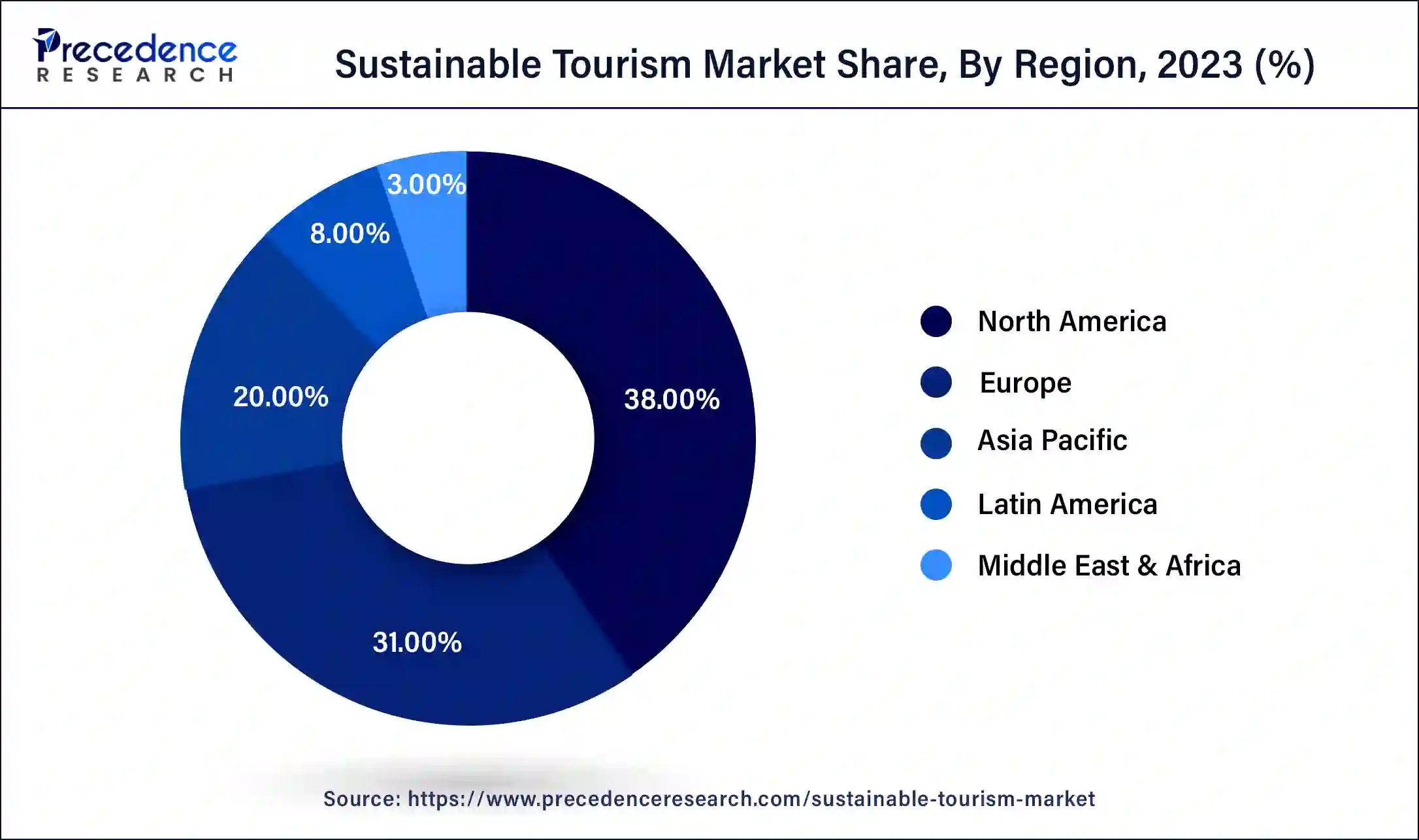November 2024
Sustainable Tourism Market (By Type: Island Tourism, Mountain Tourism, Coastal Tourism; By Application: Group, Family, Solo, Couples; By Age group: Millennial, Baby Boomers, Generation X, Silver hair) - Global Industry Analysis, Size, Share, Growth, Trends, Regional Outlook, and Forecast 2024-2034
The global sustainable tourism market size was USD 2.73 trillion in 2023, calculated at USD 3.12 trillion in 2024 and is expected to reach around USD 11.39 trillion by 2034., expanding at a CAGR of 14% from 2024 to 2034.

The U.S. sustainable tourism market size was valued at USD 730 billion in 2023 and is expected to reach USD 3100 billion by 2034, growing at a CAGR of 14.08% from 2024 to 2034.

North America has held the largest revenue share of 38% in 2023. This is due to the growing emphasis on eco-friendly and socially responsible travel experiences. The region, includes the United States and Canada, has witnessed an increasing awareness among travelers about environmental issues and a desire to make sustainable choices. Also, sustainable tourism initiatives in North America often emphasize the preservation of indigenous cultures and heritage. Responsible tourism practices aim to engage with and support local communities, ensuring that cultural diversity is respected and celebrated.

Asia-Pacific is estimated to observe the fastest expansion. This is due to the region's commitment to balancing economic growth with environmental and cultural preservation, which positions it as a key player in the global sustainable tourism landscape. As awareness grows and sustainability becomes a priority, Asia-Pacific is likely to play a pivotal role in shaping the future of responsible travel. Moreover, several governments in the region are actively promoting sustainable tourism. Policies and initiatives focus on environmental conservation, responsible tourism practices, and the development of eco-friendly infrastructure to minimize the environmental impact of tourism.
The market's growth in Europe is mainly due to many European governments actively supporting sustainable tourism through policies that encourage environmental conservation and responsible tourism. Financial incentives and subsidies are often provided to businesses adopting eco-friendly practices.
Sustainable tourism, also known as ecotourism or ecological tourism, aims to minimize the harmful effects of travel on the planet while promoting positive economic and social benefits. It emphasizes environmental protection, biodiversity conservation, respect for indigenous cultures, and adherence to ethical principles throughout the tourism value chain. The plan aims to strike a balance between meeting the needs and expectations of visitors, improving the well-being of local people and conserving & protecting both cultural and natural resources.
The sustainable tourism market encompasses businesses, services, and activities that prioritize environmental conservation, social responsibility, and economic viability. This includes eco-friendly accommodations, responsible tour operators, community-based tourism initiatives, and efforts to promote cultural preservation. Essentially, it's about enjoying travel experiences in a way that respects and contributes to the well-being of both the destination and its inhabitants.
| Report Coverage | Details |
| Market Size by 2034 | USD 11.39 Trillion |
| Market Size in 2023 | USD 2.73 Trillion |
| Market Size in 2024 | USD 3.12 Trillion |
| Growth Rate from 2024 to 2034 | CAGR of 14% |
| Largest Market | North America |
| Base Year | 2023 |
| Forecast Period | 2024 to 2033 |
| Segments Covered | Type, Application, Age group, and Region |
| Regions Covered | North America, Europe, Asia-Pacific, Latin America, and Middle East & Africa |
Increasing global awareness of environmental issues driving travelers to seek sustainable and eco-friendly travel options.
The increasing global awareness of pressing environmental issues has sparked a transformative shift in the travel landscape, compelling travelers to actively seek sustainable and eco-friendly options. As the world grapples with the consequences of climate change and biodiversity loss, individuals are becoming more conscientious about their travel choices. This heightened environmental consciousness is a driving force behind the burgeoning demand for the sustainable tourism market.
In addition, travelers today are no longer content with mere sightseeing, they crave experiences that align with their values and contribute positively to the planet. This shift in consumer behavior has propelled businesses in the tourism sector to adapt and embrace sustainable practices. Eco-friendly accommodations, responsible tour operators, and community-centric initiatives are gaining prominence as travelers prioritize destinations that champion environmental and social responsibility.
Furthermore, governments and international organizations are also playing a role, introducing regulations and certifications that incentivize and recognize sustainable tourism practices. For instance, in September 2023, India’s G20 Presidency partnered with UNWTO to launch a new dashboard to support tourism in advancing the contribution of tourism initiatives and policies towards the Sustainable Development Goals (SDGs). Thus, the sustainable tourism market is flourishing as a response to the global call for responsible travel.
The industry's growth is not merely economic, it signifies a collective commitment to mitigating the environmental impact of tourism while fostering positive contributions to local communities. These factors drive demand for sustainable travel options and are poised to shape the future of the tourism industry, promoting a harmonious coexistence between exploration and environmental preservation.
Cost implications
The implementation of sustainable practices in the tourism industry, while crucial for environmental and social responsibility, often comes with a substantial financial burden for businesses. The high upfront costs associated with adopting eco-friendly technologies, implementing energy-efficient systems, and ensuring responsible waste management can act as a significant restraint on the demand for the sustainable tourism market. Small and medium-sized enterprises, in particular, may find it challenging to allocate resources for these initial investments, potentially limiting their ability to participate fully in the sustainable tourism landscape.
The cost factor becomes a substantial hurdle as businesses weigh the immediate financial implications against long-term sustainability benefits. While consumers increasingly express a preference for eco-conscious travel experiences, the economic feasibility of integrating these practices remains a critical consideration for businesses. To overcome this restraint, it becomes imperative for governments and industry stakeholders to collaborate in providing financial incentives, subsidies, and support mechanisms for businesses committed to sustainable practices.
Additionally, businesses can strategically communicate the long-term cost savings, enhanced brand reputation, and market differentiation associated with sustainability to bridge the gap between consumer demand and the economic challenges of implementation. Only through concerted efforts and innovative financing solutions can the sustainable tourism market truly thrive, offering a win-win scenario for businesses, the environment, and conscientious travelers alike.
Innovation in Sustainable Technologies
The integration of cutting-edge technologies not only aligns with the eco-conscious preferences of modern travelers but also propels industry towards a more environmentally responsible future. Renewable energy solutions, such as solar and wind power, offer sustainable alternatives to traditional energy sources, reducing the carbon footprint of accommodations and transportation in the tourism sector.
Advancements in waste management technologies enable businesses to adopt more efficient and eco-friendly disposal practices, minimizing environmental impact. Smart and energy-efficient infrastructure, including eco-certified buildings and green facilities, not only contribute to sustainability goals but also appeal to a growing market of environmentally aware travelers seeking responsible and comfortable stays.
Moreover, digital innovations play a crucial role in promoting sustainable tourism. Online platforms and mobile apps connect travelers with eco-friendly accommodations, responsible tour operators, and destination experiences that prioritize conservation and cultural preservation. Virtual and augmented reality technologies also offer immersive and low-impact ways for travelers to engage with natural and cultural attractions.
Thus, the continuous evolution of sustainable technologies not only addresses environmental concerns but also provides a competitive edge for businesses within the sustainable tourism market. Embracing these innovations not only meets the demands of the current eco-conscious consumer base but also sets the stage for a more sustainable and resilient future for the entire tourism industry.
The coastal tourism segment had the highest market share of 45% in 2023 based on the type. Coastal destinations attract those seeking sun, sea, and sand, making sustainability crucial for preserving delicate coastal ecosystems. Sustainable coastal tourism may involve measures to protect marine life, promote responsible water sports, and minimize pollution. Eco-friendly resorts, beach cleanup initiatives, and educational programs about marine conservation contribute to the overall sustainability of coastal tourism destinations.
The island tourism segment is anticipated to expand fastest CAGR of 15.1% during the projected period. Islands offer a unique blend of natural beauty and cultural richness, making them popular destinations. Sustainable practices in island tourism often focus on preserving biodiversity, supporting local communities, and implementing waste management strategies. Renewable energy solutions, coral reef conservation efforts, and responsible tourism policies contribute to the sustainability of island tourism.
The family segment had the highest market share of 47% in 2023 based on the application industry. Families, with a focus on shared experiences, represent a significant portion of the sustainable tourism market. Sustainable family travel involves considerations for child-friendly eco-accommodations, educational activities for children, and responsible tourism practices that align with family values.
The solo segment is anticipated to expand fastest CAGR of 15.3% over the projected period. Solo travelers, seeking independence and personal growth, contribute to the rising demand for sustainable tourism. Sustainable practices for solo travelers may include eco-conscious accommodations, ethical solo travel experiences, and initiatives that foster social and environmental responsibility.
The millennial segment had the highest market share of 49% in 2023 based on the age group and is anticipated to expand fastest over the projected period. Millennials are born between the early 1980s and mid-1990s, millennials may seek unique and socially conscious travel experiences. Sustainable tourism for millennials may involve eco-friendly accommodations, volunteerism opportunities, and destinations that align with their values of environmental and social responsibility.
Segments Covered in the Report
By Type
By Application
By Age group
By Geography
For inquiries regarding discounts, bulk purchases, or customization requests, please contact us at sales@precedenceresearch.com
No cookie-cutter, only authentic analysis – take the 1st step to become a Precedence Research client
November 2024